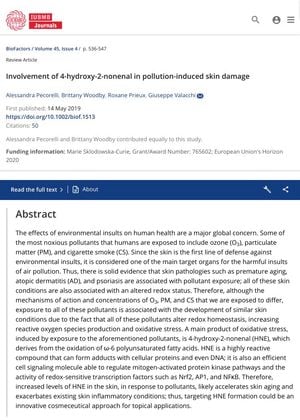Involvement of 4-Hydroxy-2-Nonenal in Pollution-Induced Skin Damage
May 2019
in “
BioFactors
”

TLDR Pollution increases a compound in the skin that can lead to faster aging and more inflammation.
The review article from May 14, 2019, discussed the impact of environmental pollutants such as ozone (O3), particulate matter (PM), and cigarette smoke (CS) on skin health. These pollutants were found to disrupt redox homeostasis, leading to increased production of reactive oxygen species and oxidative stress. This oxidative stress results in the production of 4-hydroxy-2-nonenal (HNE), a byproduct of the oxidation of ω-6 polyunsaturated fatty acids. HNE, a highly reactive compound, can form adducts with cellular proteins and DNA, and can regulate cell signaling pathways and the activity of redox-sensitive transcription factors. Increased levels of HNE in the skin due to pollutant exposure were linked to accelerated skin aging and exacerbated skin inflammatory conditions. The authors suggested that targeting HNE formation could be a novel approach for topical applications in cosmeceuticals.





